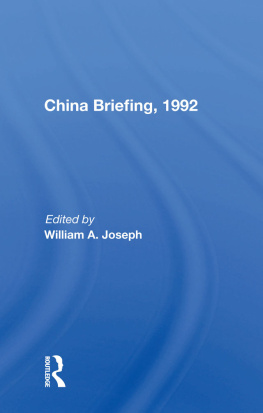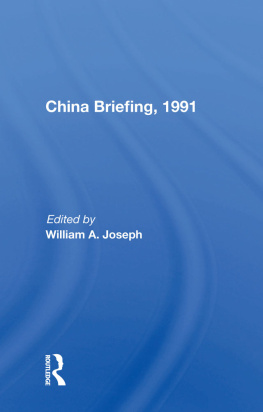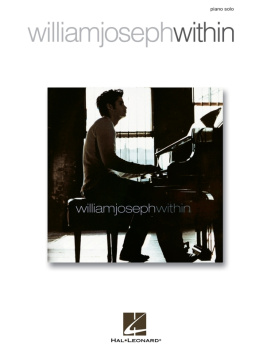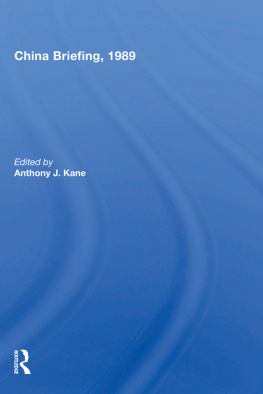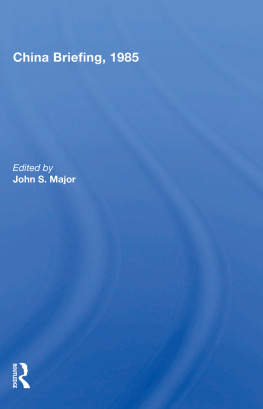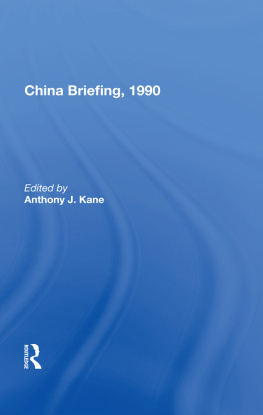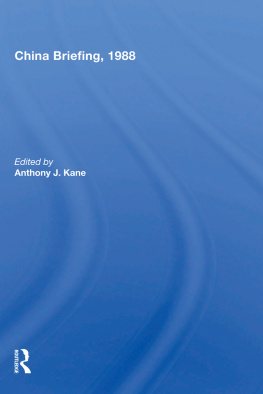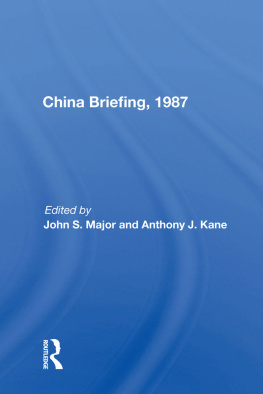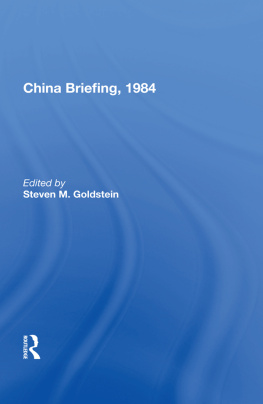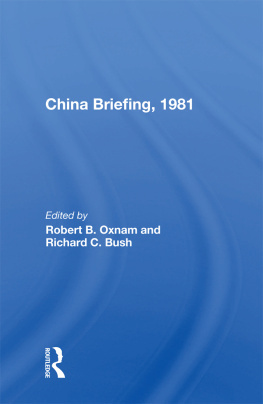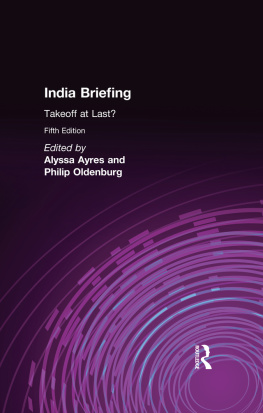China Briefing, 1992
edited by
William A. Joseph
Published in cooperation with The Asia Society
Deborah Field Washburn
Series Editor
Cover characters designed by Willow Chang
First published 1993 by Westview Press, Inc.
Published 2018 by Routledge
52 Vanderbilt Avenue, New York, NY 10017
2 Park Square, Milton Park, Abingdon, Oxon OX14 4RN
Routledge is an imprint of the Taylor & Francis Group, an informa business
Copyright 1993 by The Asia Society
All rights reserved. No part of this book may be reprinted or reproduced or utilised in any form or by any electronic, mechanical, or other means, now known or hereafter invented, including photocopying and recording, or in any information storage or retrieval system, without permission in writing from the publishers.
Notice:
Product or corporate names may be trademarks or registered trademarks, and are used only for identification and explanation without intent to infringe.
Library of Congress ISSN: 0740-8005
ISBN 13: 978-0-3670-0388-3 (hbk)
ISBN 13: 978-0-813-31603-1 (pbk)
Contents
WILLIAM A. JOSEPH
TONY SAICH
GARY H. JEFFERSON
JOHN W. GARVER
MARGARET Y. K. WOO
GAIL HENDERSON
PAUL CLARK
NANCY R. HEARST
Guide
Since its inception in the late 1970s, China Briefing has earned a deserved reputation as the best in-depth annual review of China, Taiwan, and Hong Kong, As director of The Asia Society's China Council when this publication was launched, I am especially proud to see its growing and enduring impact.
China Briefing, 1992 is one of the very best volumes in this distinguished history. Its authors have written in a crisp, substantive, and engaging style. As a result, this book is an important starting point for anyone, including specialists, seeking a capsule presentation of recent developments in China.
Such a review is especially needed in the early 1990s, now 20 years after the Sino-American detente, when American outlooks on China are deeply interlaced with suspicion. Tiananmen continues to cast a long shadow, though one now sees somewhat heightened U.S. interest in China's continued and renewed economic momentum. How we assessand how we engagethe leaders of the one-quarter of humankind in China is central to the future stability and dynamism of the Asia-Pacific region.
Many of this year's authors reflect a rising, though still cautious, optimism about the People's Republic of China and its relations with Hong Kong and Taiwan. Nineteen ninety-two has been a year of powerful recommitment to economic modernization, spearheaded by China's paramount octogenarian, Deng Xiaoping. The surge of growth in coastal South China, the rapid increase in foreign investment, and the recently unleashed capital markets are at the heart of this story.
The interweave of politics and economics is a subject of serious analysis and conjecture in China Briefing, 1992, published on the eve of the 14th Congress of the Chinese Communist Party. Who succeeds and what policies dominate are linked issues that will shape China's future for the rest of the century. Who dies, and in what order deaths occur, is important to the succession process now unfolding in Beijing, No one, not even those in the Forbidden City, knows precisely how these events will play out, but our authors offer a well-articulated array of scenarios.
But what are the broader ripple effects of succession politics and modernization economics? How does China cope with a post-cold war era in which the Soviet Union, which evolved from heroic to demonic proportions during the history of the PRC, no longer exists? How will China manage its prickly relationships with Japan (which now seem to be improving), with the United States (which have descended to an all-time low over the past two decades), and with the rest of Asia (where much hatchet-burying has occurred)? And what will be the impact of this evolution on China itselfon the arts and film, on health care, on the environment?
All these issues will unfold over many years ahead. China Briefing, 1992 does not seek to provide long-term, conclusive answers, but we think thatthanks to editor William A. Joseph and the fine team of authors he has assembledit addresses questions over the short and medium term in a timely, informative, and useful way.
Robert . Oxnam
President
The Asia Society
September 21, 1992

William A. Joseph
The 1992 Summer Olympics in Barcelona were a time of international triumph and national pride for the People's Republic of China (PRC). China won a total of 54 medals16 gold, 22 silver, and 16 bronzeto finish fourth in the overall medal count, a remarkable improvement over the 28 medals (including only 5 gold) captured in the 1988 Seoul Olympics. However, the athletic achievements at Barcelona and the accolades accorded the PRC's medal winners on their return to Beijing could not dispel the clouds of uncertainty that hang over China's future. A seemingly calm political exterior is enforced by an only slightly relaxed post-Tiananmen repression, and a recent resurgence of economic reform is threatened by deep factional divisions and a looming succession crisis. As China approaches a watershed generational change in political leadership, seething tensions and unresolved contradictions are likely to be the most telling legacies bequeathed by the last of the veteran revolutionaries to their immediate successors.
China Briefing, 1992 surveys recent developments in China's politics, economics, and foreign relations and provides longer-term analyses of the legal system, public health, and filmmaking in the PRC. The chapters in this volume help to further understanding of what has happened in China in the recent past; and by probing some of the most trenchant contradictions now present in Chinese society, they also serve as a guide to making sense of future events in China as they unfold.
One future that the leadership of the Chinese Communist Party (CCP) certainly hopes to avoid is the fate that befell the Soviet Union in late 1991. Tony Saich's chapter examines the impact of the Soviet collapse on the PRC's domestic politics and policies, while John Garver appraises the implications for China's international relations of the disintegration of Moscow's empire.
Although there were sharply differing perspectives within the CCP on how to interpret events in the Soviet Union, Deng Xiaoping seems to have concluded that Mikhail Gorbachev failed on both the economic and political fronts: the Soviet leader moved too slowly in implementing fundamental changes in the economy and too quickly in liberalizing the political system. This perspective on the Soviet collapse has reassured Deng and other top leaders that they did the right thing in suppressing the pro-democracy demonstrations in June 1989, but it has also propelled Deng to undertake a political offensive to maintain the economic vibrancy that is one of the central reasons the CCP has been able to weather the global storm that has swept away most other Marxist-Leninist regimes in the last three years. Deng's big gamble is that continued economic growth will not only restore the Tiananmen-tarnished legitimacy of the CCP, but also siphon off political discontent as the nation and its people go about the business of getting rich.





